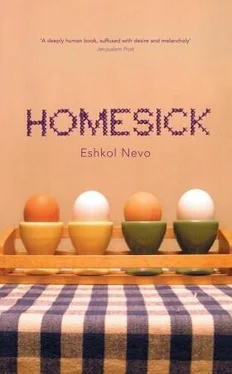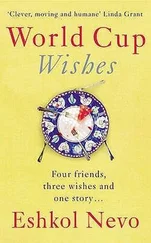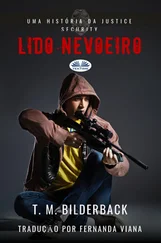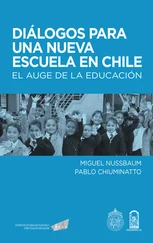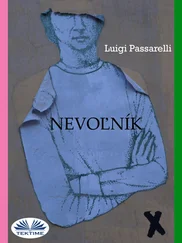Eshkol Nevo - Homesick
Здесь есть возможность читать онлайн «Eshkol Nevo - Homesick» весь текст электронной книги совершенно бесплатно (целиком полную версию без сокращений). В некоторых случаях можно слушать аудио, скачать через торрент в формате fb2 и присутствует краткое содержание. Год выпуска: 0101, ISBN: 0101, Издательство: Random House, Жанр: Современная проза, на английском языке. Описание произведения, (предисловие) а так же отзывы посетителей доступны на портале библиотеки ЛибКат.
- Название:Homesick
- Автор:
- Издательство:Random House
- Жанр:
- Год:0101
- ISBN:9781448180370
- Рейтинг книги:5 / 5. Голосов: 1
-
Избранное:Добавить в избранное
- Отзывы:
-
Ваша оценка:
- 100
- 1
- 2
- 3
- 4
- 5
Homesick: краткое содержание, описание и аннотация
Предлагаем к чтению аннотацию, описание, краткое содержание или предисловие (зависит от того, что написал сам автор книги «Homesick»). Если вы не нашли необходимую информацию о книге — напишите в комментариях, мы постараемся отыскать её.
Homesick
Homesick — читать онлайн бесплатно полную книгу (весь текст) целиком
Ниже представлен текст книги, разбитый по страницам. Система сохранения места последней прочитанной страницы, позволяет с удобством читать онлайн бесплатно книгу «Homesick», без необходимости каждый раз заново искать на чём Вы остановились. Поставьте закладку, и сможете в любой момент перейти на страницу, на которой закончили чтение.
Интервал:
Закладка:
With signs, like at a demonstration?
Without signs.
That really is the kind of thing Noa looks for.
So you’ll tell her? Maybe they’ll be standing there tomorrow.
I promised him I’d tell her. What could I say? That Noa and I weren’t talking? That I had no idea where she was?
So why’d she go? Yotam kept interrogating me.
Because sometimes people need to go away, I said, in the hope that would satisfy him.
Yes, but why? Yotam persisted. That boy is growing up right in front of my eyes, I thought. And sometimes it’s a pain.
Look, I said, trying to explain, it’s like when you sit down to do your homework — I know you haven’t done that in a while, but try to remember — first you’re concentrating and all the answers flow right out of your head into the notebook. But after a while, you get tired and bored, and you start making spelling mistakes, and all of a sudden you see that you’ve skipped a whole question. So then you know that you have to take a break for a few minutes, to get recharged.
So Noa was bored with you?
Not exactly.
So I don’t get it.
Maybe that wasn’t such a good example, Yotam. Never mind. Star Trek is starting in another two minutes. Do you want to watch it or do you want to keep on asking me annoying questions?
Yotam took the remote control and turned on the TV. I leaned back in relief. It’s hard to explain to someone else something you don’t fully understand yourself. Good, for at least the next hour, till the programme’s over, he won’t bother me any more. I’ve had enough questions thrown at me over the last few days. Everyone who’s heard that Noa left has been asking questions and I don’t have the patience for even one more.
Tell me, Yotam said when the theme song started, how come we never watched this together till now? Before I could answer, he answered himself: I know! Because every Thursday you go to that club for half-crazy people. What happened? Don’t you go there any more?
No.
Why?
*
Less than fifty kilometres, and I feel like I’ve travelled to another country. Even the light here is completely different. In Jerusalem, the light is glaring and white, and it makes your eyes burn. Here the light is muddy, always mixed with something else. From Aunt Ruthie’s apartment — she’s my grandmother’s sister — you can’t see the sea. Or the treetops. Just other people’s lives showing through their windows, so close to me that I can almost touch them. ‘Tel Aviv — Take a Peep.’ That’s how they should advertise this city in the world and give every tourist who comes here a pair of small binoculars as a gift. From the bedroom window, for example, you can see what’s cooking in the kitchen of the couple in the next-door building. At two in the morning, he sneaks into the kitchen and takes some hummus and pitta out of the freezer. Then she gets up and goes into the kitchen in her pyjamas, her hair a mess, and puts it all back before he has a chance to binge. She washes dishes in the evening. Standing behind her, he puts his hands under her shirt and holds her breasts. She shakes him off. Or gets into it, depending on her mood. Once, at lunchtime, I saw her in the same kitchen with a different man who was too old for her. He dipped his finger in some ice-cream and held it out to her, and she licked it. It was repulsive, but I couldn’t stop staring at them. And I look at the balcony that you can see from the study. There are three old brown armchairs on it. One of them is torn. In Jerusalem, no one dares expose their ears to the cold yet, but here, the evenings are pleasant and the three guys who live in that apartment sometimes go out there to smoke. The sweetish smell reaches all the way over to me. They puff away and laugh with dry throats, but there’s something sad about them. As if they’d dreamed their whole life of the day they could sit like that, on a balcony in Tel Aviv, and smoke together, and they said to themselves, we’ll be happy then, but now they’re slowly finding out that they’re not. Definitely not. Hi, you, one of them called out to me last night, what’s with that camera?! Click away, we’re living it up here, his friend said, getting up and leaning on the railing. A tanned chest gleamed in the moonlight. I stayed hidden behind the camera. Now the other two joined him and leaned forward towards me. Muscles, earrings, beards, muscles, earrings, a buckle. Hi, photographer, the buckle said, you’re invited to join us. His tone was actually friendly. And also his choice of words: ‘you’re invited’ instead of ‘ ya’allah come on over’. I shook my head. A slow, hesitant movement. Third floor on the right, he yelled. On the left, you idiot, the one without a shirt corrected him. On the left! he yelled again, as if he wanted to be the one to give me the information. This isn’t what you came here for, Noa, I reminded myself and waved goodbye to them like a movie star leaving her fans, and disappeared into the protected space of the apartment.
Since I arrived here, I hardly go out. Just to the shop in the morning to buy a roll and chocolate milk, and in the evening, to the avenue to stroll with the dog owners (and I always have strange thoughts while I’m walking down the avenue: today, for instance, I thought that sometimes our past keeps us on a leash and sometimes it sets us free).
I spend most of the day in the refuge of the apartment (what a nice word refuge is, Amir would say now). Aunt Ruthie hadn’t been in any condition to take anything with her to the hospital. Everything stayed here. Her library is still overflowing with its unique blend of books: slim volumes of poetry, small comic books and paperback romance novels. On the cabinet in the study there’s still a picture of her father when he was young. He was so handsome, she always used to say, touching the plastic frame with the tip of her finger. I always agreed with her, even when I’d grown up and knew she was exaggerating. Her paintings hung on the walls of the bedroom, the living room and the workroom, and there was a slip of paper next to each one with the name of the painting on it, just like in a gallery. Here’s ‘Self-Portrait’, a painting of a woman who doesn’t resemble Aunt Ruthie in the slightest. Once, I thought it was strange to paint someone else and call it ‘Self-Portrait’. Hanging on the right is ‘Family Tree’, whose branches scream to the heavens like the arms of someone being taken out to be executed in the Holocaust. On the opposite wall is my portrait, and next to it a sign that says ‘Girl’. I remember how she sat me down on a chair and told me not to move, and when I started to get bored and complained that my bottom hurt, she said, just a little bit more, Noa’le, and promised that ‘after we finish, we’ll go to Dizengoff and buy you a double chocolate ice-cream.’
From the first time my parents dumped me at her place, a line stretched directly between us that skipped over two stopping points: my grandmother and my mother. We used to play girls’ games together and buy clothes on Dizengoff and come home and paste collages all night — cutting from magazines and pieces of clothes. All my parents’ strict rules — you have to go to sleep at ten, you can’t watch Dallas , you can’t listen to music with the volume turned up — all those rules were cancelled for a day or two, on the condition, of course, that I didn’t tell (she was scared to death of my mother).
She was the only one, except for my father, my mother and Yoav, who knew about the stomach pumping — I told her, even though my parents wanted to hide it from her too — and she was the one who sent me to paint. I started that way too, she said, and the shadow that passed across her eyes made it clear what she meant when she said ‘that way’.
Читать дальшеИнтервал:
Закладка:
Похожие книги на «Homesick»
Представляем Вашему вниманию похожие книги на «Homesick» списком для выбора. Мы отобрали схожую по названию и смыслу литературу в надежде предоставить читателям больше вариантов отыскать новые, интересные, ещё непрочитанные произведения.
Обсуждение, отзывы о книге «Homesick» и просто собственные мнения читателей. Оставьте ваши комментарии, напишите, что Вы думаете о произведении, его смысле или главных героях. Укажите что конкретно понравилось, а что нет, и почему Вы так считаете.
